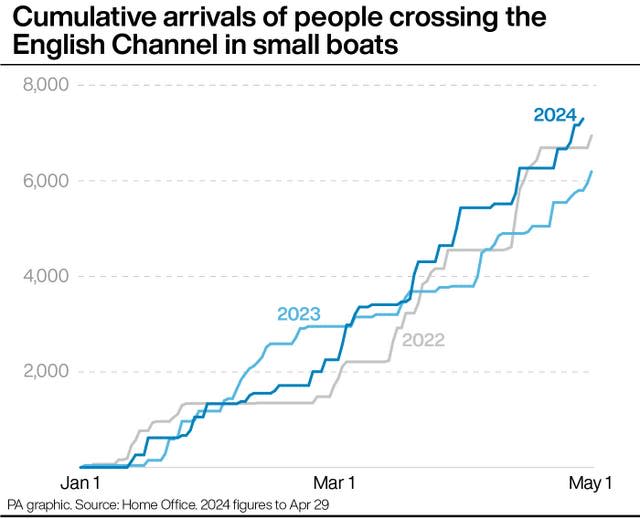Asylum seekers not reporting to Home Office ‘will be found’, vows minister

Asylum seekers who have stopped reporting to the Home Office after being earmarked for deportation to Rwanda “will be found”, a Cabinet minister has said.
According to a Government document, only 2,143 out of the 5,700 people identified for removal to the East African nation “continue to report to the Home Office and can be located for detention”.
On Tuesday, Health Secretary Victoria Atkins told Sky News that the Home Office is “used to this” and law enforcement agencies have “a range of measures” to find and remove people who are not reporting as required.
She said: “We want the message to go out loud and clear that if somebody doesn’t report as they should do, they shouldn’t think that they’ll get away with it. They will be found.”

The figures come from an impact assessment of the Government’s Migration and Economic Development Partnership with Rwanda, under which the UK has agreed to pay Kigali to take asylum seekers who have crossed the Channel in small boats.
The document, updated on the Home Office’s website on Monday, also acknowledges there could be further delays to deportations caused by MPs making last-minute representations to suspend removals.
There is a long-standing parliamentary convention whereby removals can be suspended until a case has been considered and a response issued to the MP.
The assessment says that, given the “novel nature” of the scheme, “we may expect future (Migration and Economic Development Partnership) cases to attract significant attention from MPs, and responders may be overwhelmed by cases, causing a delay or removal to be cancelled pending a response”.
It appears to be the latest in a series of setbacks to the Government’s stalled scheme to deport some asylum seekers to Rwanda, which was announced two years ago but has yet to see a flight take off.
The Prime Minister’s official spokesman said it was “not an accurate representation” to say about half of asylum seekers earmarked for deportation to Rwanda cannot be located.
While the spokesman said the initial 2,000 people have been identified for removal and placed on immigration bail with strict reporting conditions, the Home Office “continues to have a wide range of tools” to keep in contact with the remaining number including “face to face and digital reporting” and many are “residing in Home Office accommodation”, he said.
Asked whether the Government knows where all of them are, he did not answer directly but said the Home Office has “highly trained” teams with the ability to trace people and the department remains “confident of their whereabouts”.
A Home Office spokesman said: “As the Prime Minister has made clear, we will get flights off the ground to Rwanda in the next 10 to 12 weeks.
“In preparation for flights taking off, we have identified the initial cohort to be removed to Rwanda and have hundreds of dedicated caseworkers ready to process any appeals.”
Shadow immigration minister Stephen Kinnock described the situation as a “farce” that “exposes the total lack of grip the Conservatives have over the asylum system”.
He said: “The Prime Minister promised to detain and remove all those who crossed the Channel. Now he can’t even locate those intended for removal.
“How can the Conservative Home Office keep losing so many people?”
Meanwhile, Rishi Sunak rejected the idea of accepting the return of asylum seekers from Ireland amid concerns the policy is driving migrants across the border into the republic.
The Prime Minister said he is “not interested” in a returns deal if the European Union does not allow the UK to send back asylum seekers who have crossed the English Channel from France.
The Irish Government has claimed the number of asylum seekers crossing from Northern Ireland is now “higher than 80%” of Ireland’s overall total due to a shift in migration patterns in recent months.
The issue was discussed by the UK and Irish Governments at high-level talks in London on Monday.
The Irish Government has proposed new legislation to make it easier to send migrants to the UK, effectively reversing an Irish High Court ruling that the UK is no longer a “safe third country” for returning asylum seekers because of the Rwanda plan.
At a joint press conference in Westminster, Northern Ireland Secretary Chris Heaton-Harris and Irish deputy premier Micheal Martin sought to play down any rift over the issue.

Mr Heaton-Harris said: “The UK’s new deterrent is clearly working and having some impact already, an impact that will obviously increase as the first flights take off for Rwanda.
“We will obviously monitor all this very closely and continue to work with the Irish Government on these matters.”
Mr Heaton-Harris said there is “no way that we would want to upset our relationship with Ireland”.
There is a “joint commitment to protect the common travel area from abuse”, he added.
The Cabinet minister said that, while the deterrent effect was anticipated, “we are slightly surprised that it manifested itself so quickly after the Act became law”.
He added that he is “comfortable” with the Irish Government’s proposed legislation, which he said is resetting the legal position after the Irish High Court ruled that the UK is no longer a safe country.
Mr Martin highlighted the need for international action to curb irregular migration.
He acknowledged that any agreements on returns would have to be “mutual” and “reciprocal”.
In a joint statement, Amnesty International UK and Ireland chief executives Sacha Deshmukh and Stephen Bowen said: “The UK and Irish Governments pointing fingers at each other rather than addressing the asylum claims of people on their respective territories is a deeply unedifying spectacle that harms both the international refugee system and the people the system is there to protect.”
Meanwhile, Channel crossings continued, with groups of migrants pictured being brought ashore in Dover, Kent, on Tuesday.
More than 7,000 migrants have arrived in the UK so far this year after making the journey from France – a new record for the first four months of a calendar year.
Some 132 arrivals were recorded on Monday in three boats, taking the provisional total for 2024 to 7,299.

 Yahoo News
Yahoo News 
